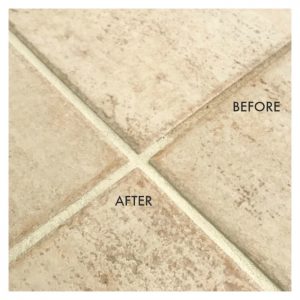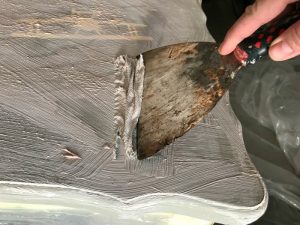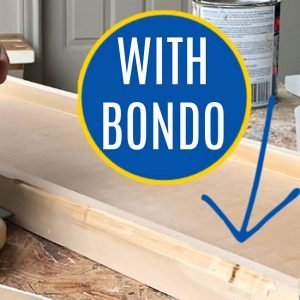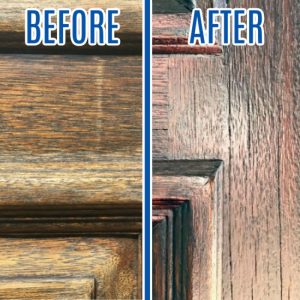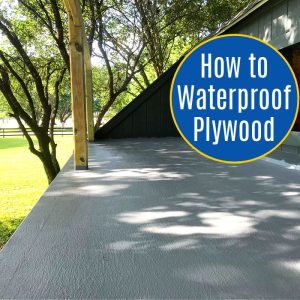EASY STEPS & QUICK VIDEO guide for using Bondo to Repair Wood Rot. In just 1 day, this DIY saved our rotted wood shutters from the burn pile.
Using Bondo to Repair Wood Rot or Damaged Wood
Last year, I decided I couldn’t avoid fixing our exterior shutters any longer. The bottom of each shutter had taken on water somehow and was rotting.
I knew right away I’d be using Bondo to repair the wood rot on these shutters.
We had our house painted a few years ago, and the painters used it to repair some damage to the columns around our front porch. It held up well.
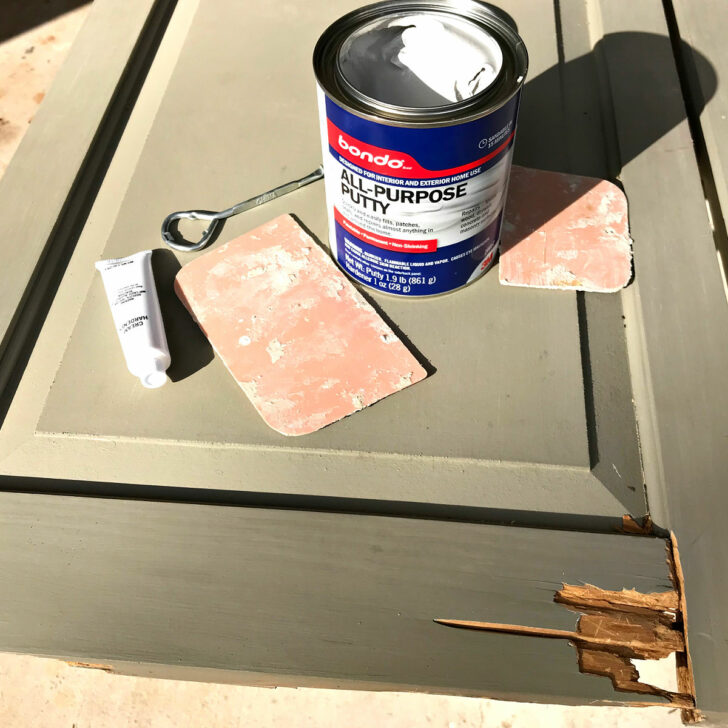
So, why not use it again? Plus, it dries so fast, it makes the repair work so much faster than normal wood filler.
Now, let’s get to the easy steps for how to use Bondo to repair wood rot!
Table of contents
Using Bondo On Wood Rot – Video
If any of the written steps are confusing, be sure to watch this video to see me actually mixing and using Bondo for wood rot repair on our exterior shutters.
How to Use Bondo On Wood Rot
Materials Needed
- Bondo All Purpose Putty or Bondo Wood Filler
- Bondo Spreader, 3 Pk
- Protective Gloves
- Sander
- Tools to Remove Soft and Rotten Wood: Utility Knife, Flathead Screwdriver, Chisel, etc.
- Optional: Bondo Wood Hardener
Quick Guide to Steps
- Clean away all soft wood rot or use wood hardener to harden the soft wood.
- Replace large sections of missing wood with new wood.
- Mix and apply Bondo All Purpose Putty.
- Sand smooth after it hardens.
Keep Reading for a detailed explanation for using Bondo on wood.
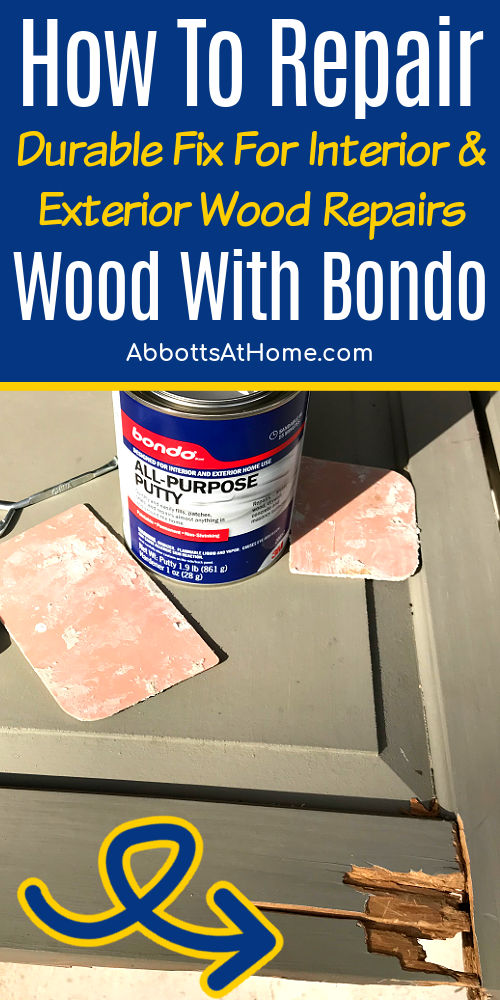
Step One – Remove Wood Rot Or Harden It
Start by cleaning and prepping the surface for Bondo. This can be done in basically 2 ways.
One is removing all the soft and rotten wood with chisels, utility knives, screwdrivers, or whatever you have on hand. That’s what I went with.
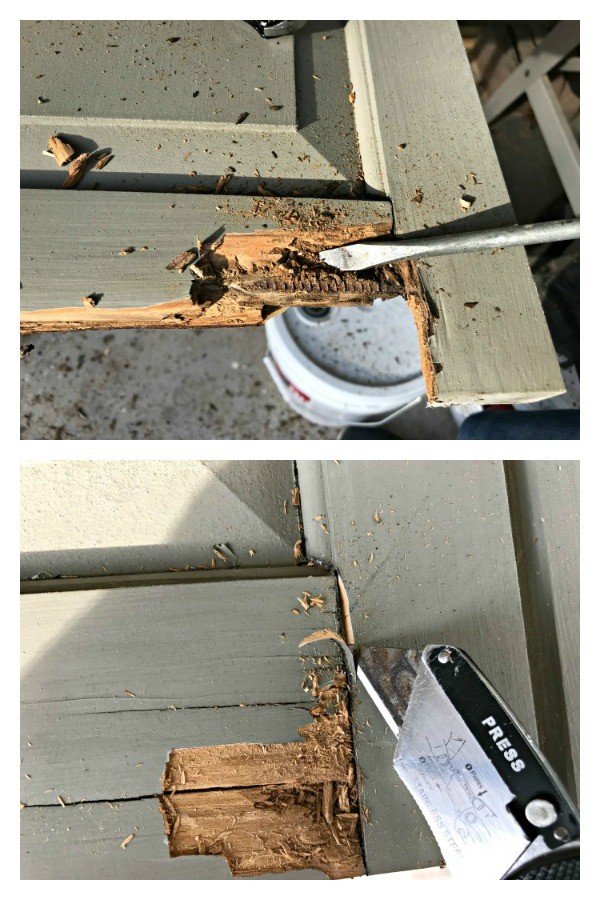
Two is, removing just any mold, then hardening the rotten, soft wood with Bondo Wood Hardener, before applying the Bondo Putty.
I’d go with hardener on curvy or routed wood. It’s hard to recreate that detail with wood filler or putty.
Step Two – Add Wood Where Needed
You may want to replace large sections with wood, to create a good base and scaffold for the Bondo to stick too.
One of my shutters lost so much wood, that I replaced the bottom with new wood. Then filled in between the old and new with the Bondo.
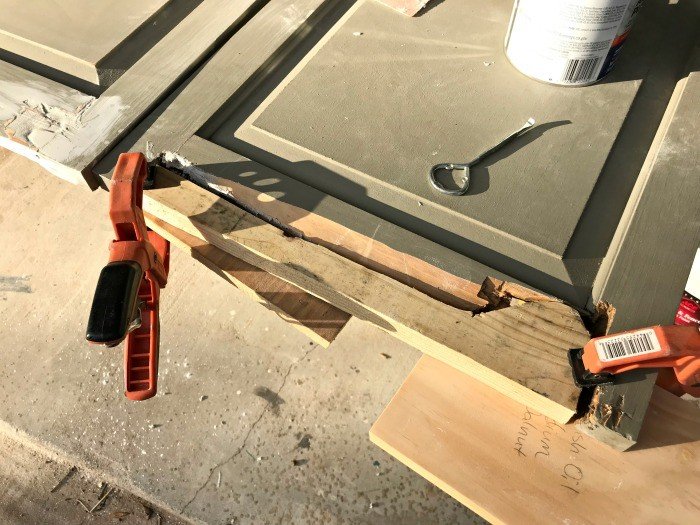
Step Three – Mix & Apply Bondo
Once the surface is solid, hard and clean, you can apply the filler. Mix just the amount you can use in about 5 minutes. Follow the directions on the Bondo. You can see how I mix mine in the video above.
When using Bondo to repair wood rot, always wear gloves and work in a well-ventilated area. The fumes are quite strong and even flammable. Mix the Bondo, then apply it to the area.
Spread it around with the spreaders. Try to get it as smooth as possible and filled over the level you need it at. Be sure to wear a mask, while sanding!
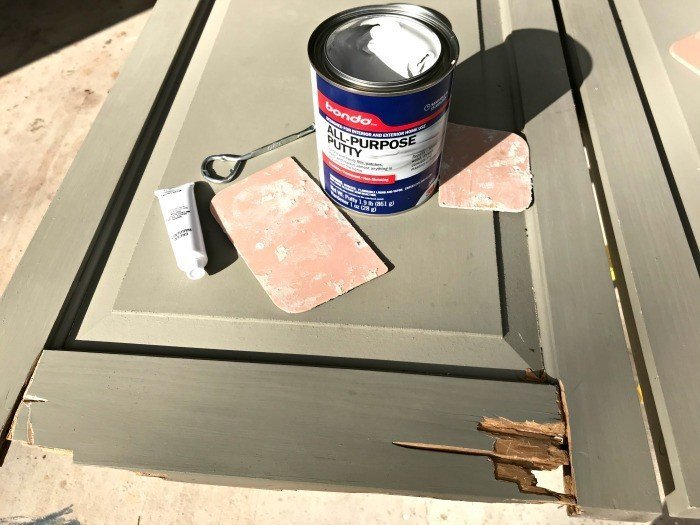
Step Four – Sand And Repeat, If Necessary
Let harden for 30 minutes, then sand smooth with your sander. I used 80-grit to start, to make quick work of the sanding. Once, you’ve smoothed to the right level. You can decide if you need to add more Bondo.
I tend to just use normal wood filler on shallow dings and divets. Once, the wood is smoothed and sanded to a medium grit, it’s ready for a few good layers of exterior paint and primer.
Or, you can sand to a fine grit and stain or seal with an exterior-grade product.

I do not recommend patching large areas that will be stained. It is very hard to match the filler to the wood and will likely look patched.
But, smaller areas are less obvious and may work fine. It’s easier to hide a large patch with paint.
And, be sure to use the Bondo wood filler, if you are hoping to stain the wood. The putty dries grey and doesn’t stain well.
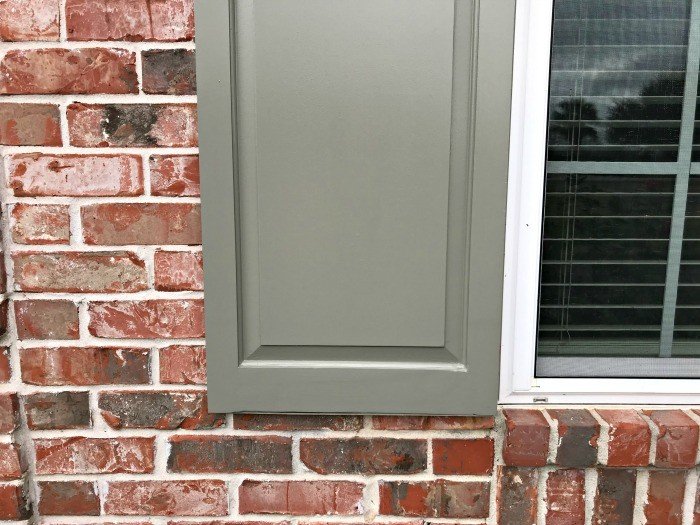
If you do need to stain patched sections, I recommend using gel stain because you can’t get a great wood stain look over paint or old wood. So, it would give the best result on Bondo.
Check out my steps for using it in How To Stain Wood Furniture Without Stripping (4 Easy Steps And Video).
That’s it for Using Bondo to Repair Rotted Wood. Good luck with your repair! 🙂
Can You Use Bondo On Wood?
Yes, you can use Bondo on wood. I have used Bondo to repair interior and exterior wood for years. Bondo dries fast, and as hard and strong as wood, making Bondo a great way to repair wood.
To repair wood with Bondo, use Bondo All Purpose Putty or Bondo Wood Filler. Then follow the steps and video above for how to use Bondo on wood.
More DIY Projects For You
Looking for more handy DIY projects for your home? Check out my favorite way to fix ugly grout that won’t scrub clean.
Or, my steps for the easy way to strip paint from wood furniture.
Here’s How to Fix Damaged Wood Furniture with Bondo.
I love this easy DIY for How to Restain a Front Door without removing it.
Try this DIY for how to waterproof a plywood deck, roof or balcony.
How to Use Bondo for Wood Rot Repair

Using Bondo to Repair Wood Rot saved our Exterior Shutters from the burn pile! Here’s the easy steps.
Materials
- All Purpose Bondo
Tools
- Power Sander
- Various Tools, like a Chisel, Utility Knife, and Putty Knife
Instructions
How to Use Bondo to Repair Wood Rot
Quick Guide to Steps
- Clean away all soft wood rot or use Hardener to harden the soft wood.
- Replace large sections of missing wood with new wood.
- Mix and apply Bondo All Purpose Putty.
- Sand smooth after it hardens.
Keep Reading for a detailed explanation of each step.
Step One
Start by cleaning and prepping the surface for Bondo. This can be done in basically 2 ways. One is removing all the soft and rotten wood with chisels, utility knives, screwdrivers, or whatever you have on hand. That’s what I went with.
Two is, removing just any mold, then hardening the rotten, soft wood with Bondo Wood Hardener, before applying the Bondo Putty. I’d go with hardener on curvy or routed wood. It’s hard to recreate that detail with wood filler or putty.
Step Two
You may want to replace large sections with wood, to create a good base and scaffold for the Bondo to stick too. One of my shutters lost so much wood, that I replaced the bottom with new wood. Then filled in between the old and new with the Bondo.
Step Three
Once the surface is solid, hard wood and clean, you can apply the filler. Mix just the amount you can use in about 5 minutes. Follow the directions on the Bondo. You can see how I mix mine in the video.
When using Bondo to repair wood rot, always wear gloves and work in a well-ventilated area. The fumes are quite strong and even flammable. Mix the Bondo, then apply it to the area.
Spread it around with the spreaders. Try to get it as smooth as possible and filled over the level you need it at. Be sure to wear a mask, while sanding!
Step Four
Let harden for 30 minutes, then sand smooth with your sander. I used 80-grit to start, to make quick work of the sanding. Once, you’ve smoothed to the right level. You can decide if you need to add more Bondo.
I tend to just use normal wood filler on shallow dings and divets. Once, the wood is smoothed and sanded to a medium grit. It’s ready for a few good layers of exterior paint and primer. Or, you can sand to a fine grit and stain or seal with an exterior-grade product.
I do not recommend patching large areas that will be stained. It is very hard to match the filler to the wood and will likely look patched. But, smaller areas are less obvious and may work fine. It’s easier to hide a large patch with paint.
And, be sure to use the Bondo wood filler, if you are hoping to stain the wood. The putty dries grey and doesn’t stain well.
That’s it for How To Use Bondo to Repair Wood Rot. Good luck with your repair!
Thanks for checking out my Steps for Using Bondo To Repair Wood Rot.
Please let me know if you have questions. Don’t forget to sign up for the Abbotts At Home email newsletter to get DIY, Remodeling, and Crafty ideas in your inbox.

Stephanie Abbott has been remodeling homes, updating & building furniture, and working on DIY home maintenance and cleaning tips for over 20 years. Her remodeling has been featured in Better Homes and Gardens Magazine. And, her DIY YouTube channel has had more than 8 million views.
Most of the DIY tutorials and videos on this site focus on beginner to intermediate level DIY Projects that can be done in an affordable way without high-end, expensive tools. All of the cleaning tips on this website have been tested in her home.

